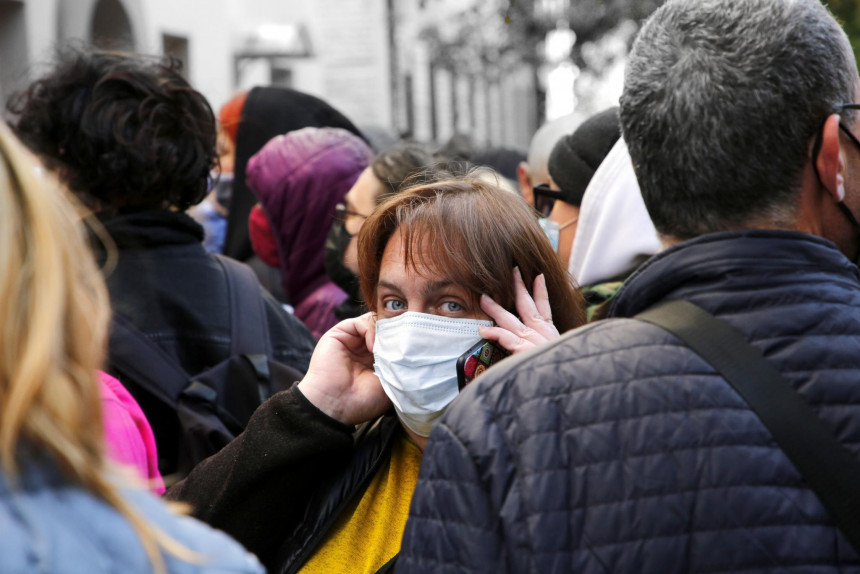Two important dates for easing safety measures in Latvia: March 1 and April 1

With the Ministry of Health forecasting a reduction in the incidence of Covid-19 at the end of February, the government has already decided on a major relaxation of safety measures from March 1.
A number of safety measures have already been relaxed as of this week, but these mainly concern educational establishments. The epidemiological outlook is so bright that all restrictions, including the mandatory wearing of masks, are to be lifted completely on April 1.
Quarantine for schoolchildren is eased
Despite the still high incidence of Covid-19 (almost 12,000 new cases were detected on Wednesday and 20 patients died), the government has already agreed to ease safety measures. The first relaxations have already come into force this week. Pupils who are contacts of someone infected with Covid-19 no longer have to be isolated at home, unless they are contacts of a sick family member with whom they live in the same household. In that case, quarantine continues for as long as the sick family member is in isolation.

Additional exemptions apply from February 16. Children will be able to take part in interest-based education and attend events without additional requirements (testing, vaccination, recovery certificate). Quarantine measures in kindergartens have been lifted if the contact with the Covid-19 infected person was outside the household and there are no symptoms of the disease. The Ministry of Health explains that, for example, if a Covid-19 infected child is in a kindergarten group, he/she goes into isolation, while other children can continue to attend kindergarten without being quarantined. If contact with an infected person is within the household, the child must be quarantined. From this week, commercial outlets can also operate without any restrictions on opening hours.
What safety measures will be in place from March 1?
In view of the forecast that the incidence will decrease towards the end of February, safety measures will be significantly reduced from March 1. Sectors that are currently closed - indoor entertainment events, gambling, nightclubs, attractions - will be able to reopen and working time restrictions will be lifted.
The maximum number of visitors at organized events will be increased from 500 to 3000 and there will be no need for registration and personalized seating. Indoor private events will be allowed to accommodate up to 50 people, while outdoor events will be allowed to accommodate up to 250 people. The limit on the number of group participants will also be lifted from March 1 for amateur activities, sport and education. The requirement to wear medical masks or an FFP2 respirator indoors will remain in force throughout March.
Requirement for certificates in shops to be revoked
The government has decided to remove the requirement for Covid-19 certificates in retail, meaning that there will be no more so-called green or red zones, but in order to reduce the risk of Covid-19 spreading, shops are required to provide at least 15 square meters of publicly accessible space per visitor at the point of sale. Thus, no certificate will be required when visiting shops, but a limited number of people will be allowed in the shops at any one time.
The requirement for a certificate will also be waived for outdoor events, churches and religious events. However, certificates will be required for a number of events: public sporting and cultural events, discos, nightclubs, sports and amateur activities, catering, cafes and restaurants. The Ministry of Health points out that public indoor events, certain services and rehearsals of amateur groups will require a certificate as strict epidemiological precautions still need to be maintained for people who do not have a vaccination or recovery certificate.
Teachers and others will need a Covid-19 certificate
The requirement for a vaccination or recovery certificate has been maintained in a number of areas. This will be needed for teachers and childcare workers; social and health care workers; public sector workers who provide day-to-day services to clients; those working in prisons; and those providing services where there is client contact.
At the same time, employers will have the right to assess jobs that present a higher risk of infection (close contact with the recipient of the service, contact with a large number of people whose vaccination status is unknown, carrying out duties that are essential for the continuity of the business). The employer will be entitled to ask these workers to carry out their work only with a certificate of vaccination or recovery.
What will happen on April 1?
As the incidence of illness decreases, all safety measures are planned to be lifted from April 1, keeping the recommendations to wear medical masks, FFP2 respirators, keep your distance and ventilate the premises. The Ministry of Health told Neatkarīgā that from April 1, masks would indeed no longer be mandatory, as only the recommendation would remain.
